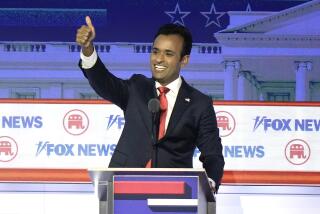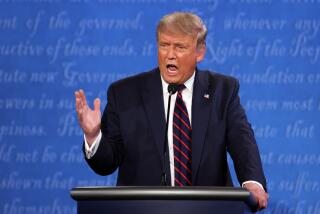Longshot Keyes Aims to Be Heard Above the GOP Din
- Share via
MASON CITY, Iowa — An oratorical maestro in a black pinstripe suit, Alan Keyes knows that once he’s brought a crowd to a giddy peak with his refrain of abolishing the income tax or his chorus on reinstating school prayer, he must ease them back down.
So, frequently, the longshot candidate for the Republican nomination--who placed a strong third in the Iowa caucuses Monday--interlinks his thin fingers, presses his thumb tips together and points them toward his shoes. And down he leads the audience on a dirge of a speech about moral decline or governmental decay--before taking them right back up again.
“We are,” he roared at the climax of one recent speech, “the most decent people who have ever existed on the face of this planet!” The audience erupted. They do every time.
If the fiery conservative could jam every voter in America into a 300-seat auditorium, entrance them with an hour of his Old Testament themes of right and wrong and send them straight to the voting booth, he would strike fear in the hearts of the front-runners.
That isn’t going to happen. But in a primary campaign that has already seen several televised debates, with another slated for tonight, the endlessly eloquent, often indignant Keyes has gained considerable ground, thanks in large part to oratorical skills so keen he actually tires of hearing how good he is.
After winning 14.3% of the caucus vote, Keyes is expected to arrive in New Hampshire today on a wave of unexpected momentum, growing campaign coffers and seamless--and seemingly unending--rhetoric.
“My goal now,” Keyes quipped in a recent interview, “is to move people beyond saying ‘That was a great speech,’ to move them all the way to the message.”
The message, in highly distilled form: America is a great, God-fearing nation about to go the way of the Roman Empire.
Although New Hampshire is not the breadbasket of religious conservatism that Iowa is, many observers believe that if Keyes’ message plays at least moderately well there, he could siphon votes away from fellow conservative Steve Forbes, who placed second in the caucuses behind Texas Gov. George W. Bush.
“I think he is really making a strong move to be the voice of social conservatives,” said John Green, a University of Akron professor and an expert on the politics of the religious right. “And I suspect that Keyes might again be a contender in New Hampshire.”
Some analysts skeptically question if he will be able to duplicate his Iowa showing. And some wonder if his success is simply a sign that the man can talk and people love to listen to him, perhaps as much as he apparently does.
College Helped Shape His Politics
The son of a career Army man and a homemaker, Keyes, 49, a devout Catholic, was an award-winning debater before he was out of high school. But it was not until college that he began to form his absolutist political philosophy and accompanying rhetoric that has grown to include the phrases “murder in the womb” for abortion and “slave tax” for income tax.
Outraged at the protests against the Vietnam War, a young and openly ambitious Keyes left Cornell University after gun-toting students occupied an administration building. He headed for Harvard.
His 1979 doctoral dissertation, “Ambition and Statesmanship,” was based on the writings of Alexander Hamilton and inspired, according to his graduate advisor, by a wickedly insightful quote from Hamilton: “Love of fame [is] the ruling passion of the noblest minds.”
“He is not lacking in self-confidence,” said Jack Pitney, a former Republican National Committee official who teaches politics at Claremont McKenna College. “He sees himself as a teacher, and the race is a wonderful classroom--hundreds of thousands of students, and they’re all paying attention.”
Forty pounds lighter than during his 1996 run for the White House, Keyes travels with a laptop computer, amusing himself by building virtual nations in a game called “Age of Empires.” He speaks French and Spanish and knows a bit of Russian and Greek. He plays the piano, as well as classical guitar. He quotes everything from the Declaration of Independence to the Book of Genesis to foreign policy papers from the Carter administration.
He is the quintessential academic, yet his philosophy is decidedly anti-intellectual, for there is almost no gray in his beliefs. There is right and there is wrong. The right is God’s right, funneled through the Constitution. The wrong usually comes from liberals and big government.
“The question of God in American life is not a question of my personal feeling or George Bush’s personal feeling,” Keyes said in one debate. “It’s a simple fact that in our great Declaration we are told that our rights come from the Creator, God. How on earth are we to maintain institutions sourced in that authority if we deny that authority?”
It is perhaps a perfect philosophy for campaigning, if not necessarily winning, because seemingly difficult questions are not difficult at all for Keyes. And he often lights up when asked one.
During a recent forum in this small Iowa town, he was asked about the U.S. giving the Panama Canal to Panama. Keyes began his five-minute reply with this: “We have built the mightiest military on Earth . . . I think we ought to take it back.”
Such are the simple, forceful messages--poetically delivered--that have attracted a growing legion of volunteers and $3.5 million in campaign contributions. According to his campaign, about a third of those dollars have come in the last month or so, about the time of the presidential debates.
“Alan is like the political father,” Rob Thompson, Keyes’ New Hampshire campaign director, said Tuesday in Manchester, N.H. “He’s not afraid to tell us we messed up and what we have to do to make it right.”
In a campaign office filled with the works of Plato, Thucydides and Aristotle, as well as copies of the Bible and the Lincoln-Douglas debates, Thompson smacked his hand down hard on a table. “Alan,” he said, “will discipline the country like a wayward child.”
Keyes began his career in government soon after earning his PhD in government affairs, serving as U.S. vice consul in Bombay, India. There, he met his wife, Jocelyn. The couple has three children.
While in India, Keyes also caught the attention of then-U.S. ambassador to the United Nations Jeane J. Kirkpatrick, who helped secure his appointment as U.S. ambassador to the U.N. Economic and Social Council in the 1980s.
Keyes--who prefers to be addressed as either “Dr. Keyes” or “Ambassador Keyes”--went on to join the secretary of state’s office in the Reagan administration, vociferously opposing sanctions against South Africa’s white-minority government under Reagan’s policy of “constructive engagement.”
He was, and still is, an anomaly: A conservative African American who not only thrived in the Reagan administration but contends that liberal social policies of recent decades have hurt blacks more than slavery did. Though not hesitant to criticize the media as racially biased for not covering him, he does not make race the centerpiece of his campaign.
Iowa is 97% white, and it is unclear how the campaign will play in more diverse regions. But some observers believe Keyes could prove the man to, as Green put it, “do what Republicans have tried unsuccessfully to do for 30 years--bring socially conservative blacks into the fold.”
No Stranger to Controversy
Following his stint in the Reagan administration, Keyes’ views and silky delivery propelled him into talk radio.
Despite that support, however, he has failed in two bids for the Senate in Maryland, during which he was harshly criticized from Republicans and Democrats alike for paying himself $8,500 a month with campaign funds.
In the midst of his quixotic second run for the Republican nomination, many wonder whether Keyes could be elected to any state or national office, let alone the presidency. His platform, after all, calls less for reform than a complete make over, from abolishing the Internal Revenue Service and Department of Education to reinstating school prayer.
Some critics suggest Keyes’ run is more about ego and fatter speaker’s fees. In 1994, before his first presidential bid, Keyes delivered just two paid speeches and earned no more than $5,000 from each, Federal Elections Commission documents show. After the 1996 campaign, Keyes delivered more than 20 speeches annually, and his fee rose as high as $15,000.
Giving speeches, perhaps, is the one certainty in his future. Alan Keyes will continue to speak. And whether all listeners agree with what he says about abortion, taxes or gays in the military--he’s firmly against that--they might admire how he says it.
*
Times staff writer Elizabeth Mehren, reporting from Manchester, N.H., contributed to this story.
More to Read
Get the L.A. Times Politics newsletter
Deeply reported insights into legislation, politics and policy from Sacramento, Washington and beyond. In your inbox twice per week.
You may occasionally receive promotional content from the Los Angeles Times.










